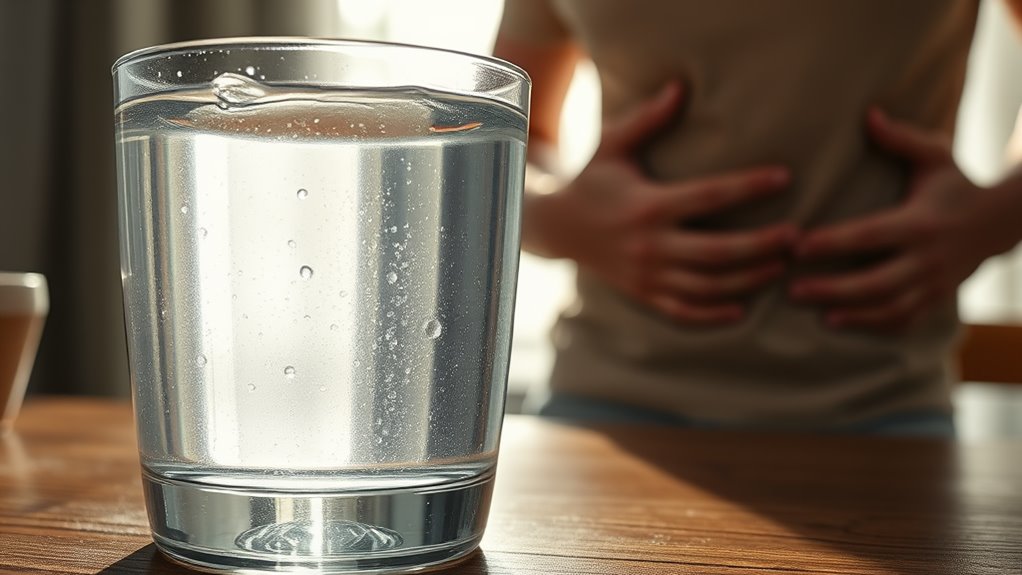
If your stomach hurts after drinking water, it could be due to several factors. Rapid intake might stretch your stomach, causing discomfort. Cold water can irritate your stomach lining, especially on an empty stomach. Underlying conditions like IBS or acid reflux may also play a role. Additionally, water composition and your drinking habits can contribute to the pain. Understanding these causes is essential for relief, and there's more to explore on this topic.
Experiencing stomach pain after drinking water can be perplexing and uncomfortable. You might wonder why something as simple as hydration can lead to such distress. Several factors could be at play, and understanding them can help you identify the cause of your discomfort.
One common reason for this pain is stomach distension, which occurs when your stomach expands due to rapid or excessive water intake. If you gulp down water too quickly, it can stretch the stomach, triggering nerve receptors that signal fullness. This sensation can lead to discomfort and pain, especially if you're sensitive to such changes. While gastric distension is a normal process, individuals with heightened sensitivity may experience intensified discomfort. Fortunately, this generally resolves once your stomach empties.
Stomach distension from rapid water intake can trigger discomfort, especially in sensitive individuals, but it typically resolves as the stomach empties.
The temperature of the water you drink also plays a significant role. Cold water can provoke stomach muscle contractions and irritate the stomach lining, leading to pain and discomfort. If you tend to consume ice-cold water, especially after meals, you might notice exacerbated digestive issues. On the other hand, warm or room temperature water often causes less irritation. Using warm water may be particularly beneficial for those with sensitive stomachs.
Be mindful that temperature sensitivity may be more pronounced on an empty stomach, potentially causing nausea or additional discomfort.
Underlying health conditions can further complicate the situation. If you suffer from Irritable Bowel Syndrome (IBS), water intake can lead to bloating and pain. Acid reflux may worsen with water consumption, as it stretches the stomach and increases acid production. Conditions like gastritis, characterized by stomach inflammation, can also react poorly to water intake. Functional dyspepsia may impede gastric functions, leading to discomfort after drinking water. Understanding these conditions is essential in evaluating why you feel discomfort.
The composition of the water you drink may also contribute to your symptoms. High mineral content, such as calcium and magnesium, can irritate the stomach lining, while additives like fluoride and chlorine might lead to gastrointestinal issues for some individuals. Sensitivities to these substances can vary from person to person, highlighting the importance of being aware of your water source.
Additionally, electrolyte imbalances could play a role in your discomfort. Severe dehydration can necessitate electrolyte replacement, and excessive water intake without sufficient electrolytes can lead to hyponatremia, or water intoxication. Maintaining a balanced hydration routine, inclusive of essential minerals, is fundamental for your well-being.
To prevent stomach pain after drinking water, consider your drinking habits. Sipping water slowly allows your stomach time to adjust. Spreading out your water intake throughout the day will also reduce strain on your stomach.
If you tend to lie down immediately after drinking, this could exacerbate issues as well. By being mindful of these factors, you can take proactive steps to alleviate discomfort and enjoy the hydration your body needs.
Conclusion
To sum up, if you're experiencing stomach pain after drinking water, it's important to pay attention to your body's signals. Whether it's due to underlying conditions, temperature sensitivity, or something as simple as gulping too quickly, understanding the root cause can lead to relief. Like a puzzle waiting to be solved, unraveling the reasons behind your discomfort can pave the way to better hydration habits and overall well-being. Don't hesitate to consult a healthcare professional for personalized advice.



